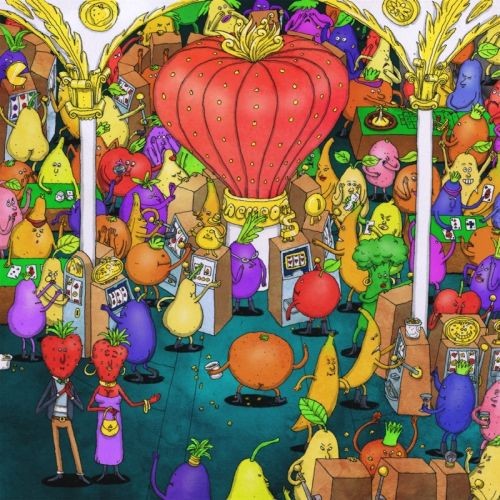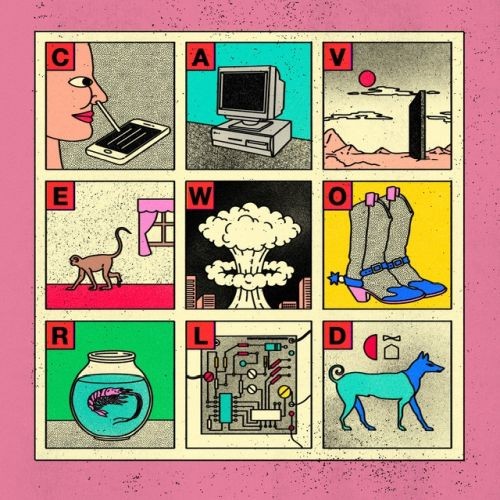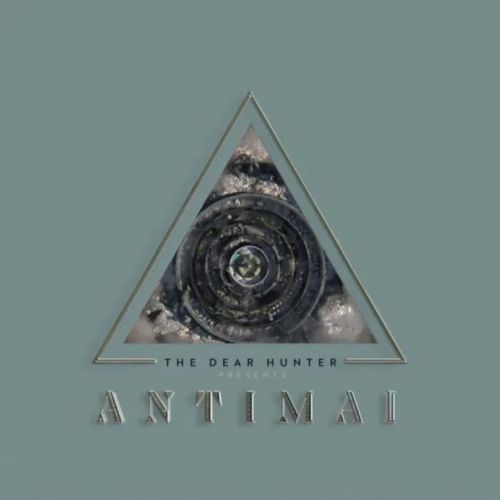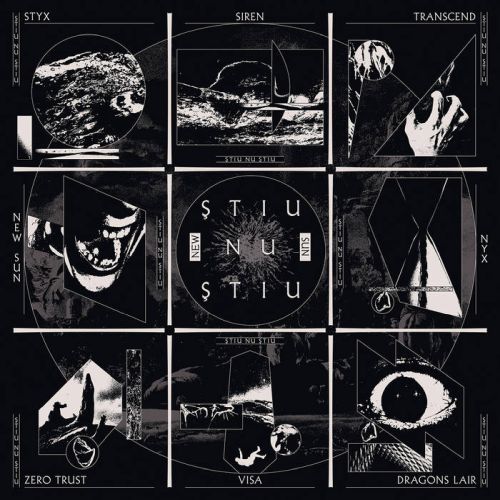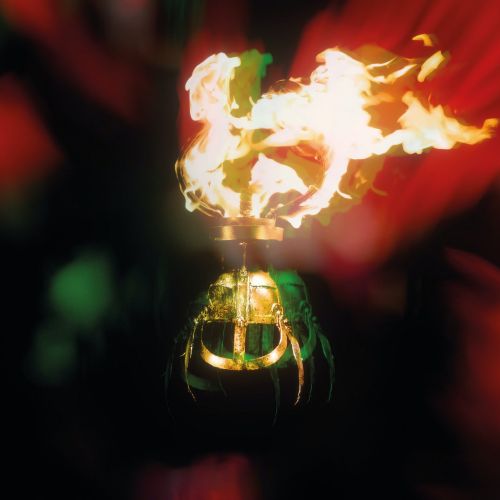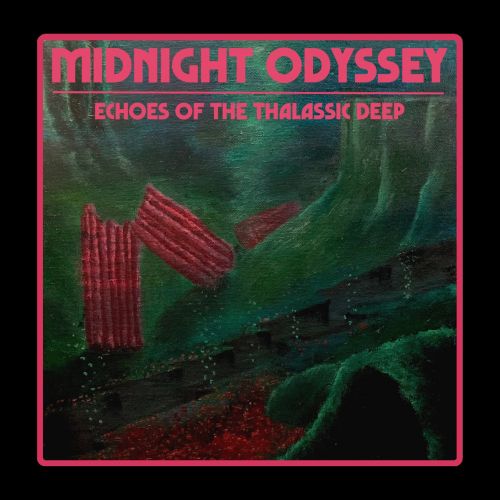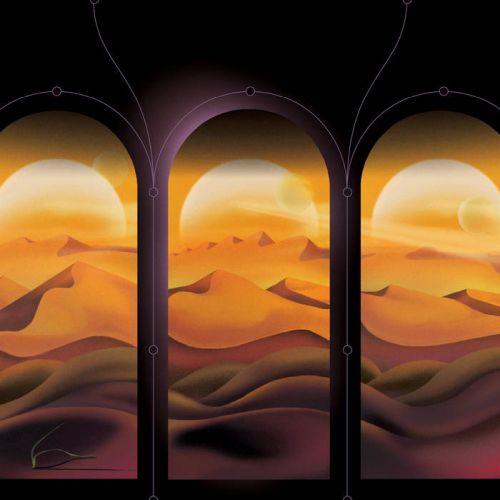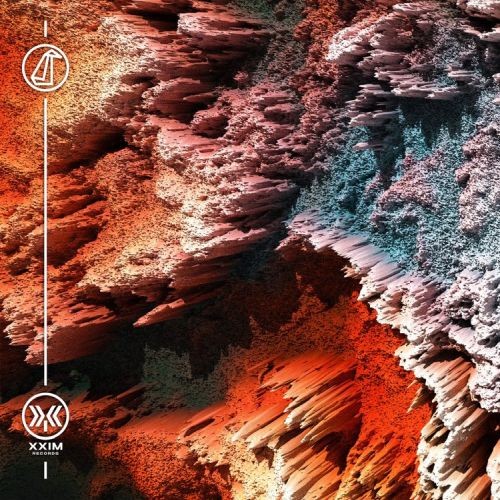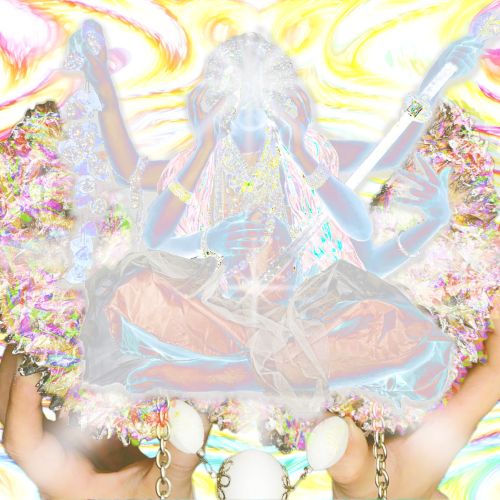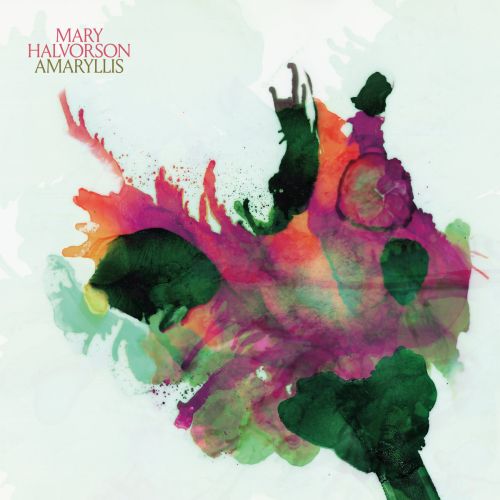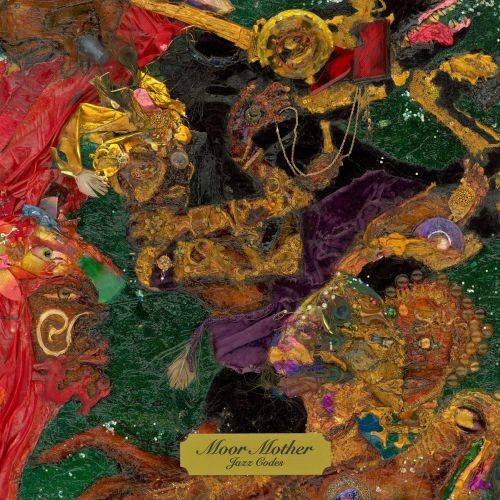Wait A Minute! This Isn't Metal! - July 2022

| Written by: | RaduP, musclassia, nikarg |
| Published: | August 13, 2022 |
Wait A Minute! This Isn't Metal! - July 2022
Metal Storm's outlet for nonmetal album reviews
The place where we'll talk about music without growls or blast beats
unless they still have those but still aren't metal
unless they still have those but still aren't metal
We here at Metal Storm pride ourselves on our thousands of metal reviews and interviews and article; metal is our collective soul and passion, which is why we bother with this junk. That being said, we'd be lying if we stuck to our trve-kvlt guns and claimed that metal is the only thing we ever listen to. Whether we want to admit it or not, we do check out some other stuff from time to time; some of us are more poptimistic than others, but there's a whole world out there aside from Satan-worshiping black metal and dragon-slaying power metal. We do already feature some nonmetal artists on our website and have a few reviews to back them up, but we prefer to limit that aspect of the site to those artists who have been a strong influence on the metal scene or who are in some way connected to it. This article series is the place for those artists who don't matter to metal in the slightest but still warrant some conversation - after all, good music, is good music, and we all know metal isn't the only thing on this planet for any of us.
Down below, you might find some obscure Bandcamp bedroom projects or some Billboard-topping superstar; as long as it ain't metal and the album itself isn't a best-of compilation, it fits. Obviously, we're certain that not everything will be for everybody (you guys can be viciously territorial even when metal is the only thing on the menu, and we're all supposed to like the same things), but we do hope you find at least one thing that you can enjoy, instead of just pointing and screaming in horror "Not metal!" as if that would be an insult.
Here are our previous features:
June 2022
May 2022
April 2022
And now to the music...
One of modern rock’s more turbulent bands has had perhaps their most turbulent year yet; album number 10 Jackpot Juicer represents their final release with bassist Tim Feerick, who tragically passed in April. It may also be the last release with Tilian Pearson on vocals, as he has stepped away from the band for the time being after allegations of sexual misconduct arose (mirroring Pearson’s arrival, as he replaced Jonny Craig following his departure for similar reasons). Pearson, and Dance Gavin Dance as a whole, have acquired a marmite reputation, so there may be some that hope that Andrew Wells’ current stint covering lead vocals on tour becomes a permanent role (for what it’s worth, as long as it doesn’t affect Eidola, I’ve got no preference), but if Jackpot Juicer is Pearson’s last album with the band, it’s a bold way to go.
With 18 tracks across 63 minutes, this is a hefty release, and with DGD’s trademark frenetic instrumentation, it’s a lot of music to digest. After a brief symphonic intro, “Cream Of The Crop” opens with an exuberant display of Will Swan’s signature mathy guitar acrobatics, rhythmic intricacy, punky energy, and the trade-off of Pearson’s emphatic clean singing and Jon Mess’ screams. The songs here are short and jump about, whether it’s slipping into a funky chorus in “Synergy”, Mess dabbling with rap-screaming on “Feels Bad Man” or Pearson hitting super-high registers in “Die Another Day”. With 18 tracks, there’s potential for an uneven experience, and Jackpot Juicer is definitely an album that loses momentum in the second half (“Current Events” in particular could be removed with no complaints). Still, while it’s an album that will grate for a number of people, I found myself enjoying it more than Afterburner, and it’s a decent enough send-off for Feerick.
Apple Music | Spotify
by musclassia
I think it is a bit ironic that I am writing this review right after watching Alex Garland's Men, a film made by a man about how men are bad (but still a decent horror movie otherwise), so to contrast that with the explosive feminist anger of this girl band is quite telling. It's been quite a while since I've come across to such a great new release that takes from the riot grrrl movement. And maybe I haven't been specifically looking for it, so that would make the impact that Baby has for me even greater, but this is definitely such a fiery and energetic album, one that isn't afraid to mix its righteous anger with a sense of playfulness.
Though the bulk of the music is post-hardcore in nature, it feels closer to punk rock than to something like screamo on the harsher side of things. This works pretty well with the playful side of the music. The vocal performance is loud and passionate and seeping with distilled rebellious punk energy. But all of it in angled with some angular riffing, bits of math rock and noise rock that add some odd rhythmic density to what would otherwise be more of a straight-forward affair, yet it doesn't detract from its manic and direct energy. So there is quite a lot musically behind the lyrics, but I'd be a fool to say that anything is more significant here than the lyrics, ones that range from the more direct to the more tongue-in-cheek to the more poetic, which makes it so much more ironic that this was released on that same damned that that Roe v. Wade got overturned.
Bandcamp | Apple Music | Spotify
by RaduP
Regardless of what you think about their music, you gotta agree that Viagra Boys have one of the best band names out there. That said, I was pretty surprised to see them coming out with a record so quick after this one. It took them three years to follow up their 2018 debut, Street Worms, and now 2021's Welfare Jazz is followed by Cave World. Yes, Welfare Jazz was released in January, and if it was released one month earlier I wouldn't be making this point. Regardless, I was surprised to hear from them this quickly, and considering how much I liked their previous one, I wasn't opposed to having a new one this hastily delivered.
What I liked about Viagra Boys, besides the bandname, is how their post-punk sound wasn't reliant on nostalgia. Even though some of what they do on Cave World is influenced by older acts, they continue expanding their sound by amping the dance-punk and synth-punk part of their sound. They're still rowdy, but in a more tongue-in-cheek and narrative way this time around. Considering the lyrics, I'd call this essential "return to monke" music, a point further driven home by that being the title of the closing track. The record satirizes a lot of the current society, with special focus on conspiracy theories, thus the rowdy nature turns a bit more into either deadpan or quirky territories.
Apple Music | Spotify
by RaduP
"Just Mustard" is a pretty off-putting band name. Its only use that I can think of is answering the hot-dog vendor about whether you want mustard, ketchup, or mayonnaise on your hot dog. But being far from the only band with an awful band name on the planet, Just Mustard make up for it by creating a pretty unique mix of rock genres. It's the kind of thing where shoegaze walls of sound, post-punk percussion, noise rock punch, dream pop vocals, post-rock structures, and gothic rock melancholia coexist. Figuring out which of these genres have any kind of primacy in their sound is a challenge, which is only a good indication of a unique sound.
The amounts of each of these genre flavors differs from song to song, some are more shoegaze-y, some more goth, some noiser, while also varying within the songs themselves. The albums finds a pretty nice balance between relying on Katie Ball's sweet ethereal vocals, and relying on the ominous and malevolent atmosphere created by the instruments. A bit of a Cranes meets Brutus (BEL) meets Slowdive meets Swirlies, but updated with a more modern interpretation. One that is quite daring at times, especially in the aforementioned contrast and balance between the vocals and the atmosphere
Bandcamp | Apple Music | Spotify
by RaduP
It was only last month as I described the new album from The Family Crest that I was namedropping The Dear Hunter once again in this series as my shining example of ‘indie(-adjacent) music I actually like’. Well, every so often I get to stop comparing them to other bands and just discuss them directly, and so it is this month with the release of Antimai, the first full-length in the Indigo Child saga (with a five-album Act story, The Dear Hunter are no strangers to multi-record concepts). Describing the world of The Indigo Child (an 8-ring city that represents the end-stage of capitalism), Antimai features one song for each ring, with some of those songs amongst the proggiest material the band have released to date.
Despite all my uses of The Dear Hunter as my indie beacon, Antimai is not particularly indie; it’s an album that falls fairly comfortably into the progressive rock genre, albeit not in the traditional retro sense. Instead, Casey Crescenzo’s empassioned vocal harmonies, emphatic orchestrals, and flirtations with the likes of funk and R&B permeate the record. Some of the sounds pop up on different tracks; there’s a downtrodden folk wistfulness to “Ring 8 - Poverty”, “Ring 7 - Industry” brings the funk, and “Ring 6 -LoTown” features some of the big stage inclinations that previously popped up on the likes of Act IV: Rebirth And Reprise. Crescenzo’s ambitions might not always click with everyone; “Ring 3 - Luxury” puts its near-10 minutes to good use by fitting in Pink Floydisms alongside ranting vocals, Caribbean steel drum detours and other songs, and it’s a song that I’m not always completely on board with. However, with a couple of releases since the Act series went on hiatus that I’ve not overly gelled with, Antimai suggests that the Indigo Child saga will be another odyssey to savour from The Dear Hunter.
Apple Music | Spotify
by musclassia
According to Google translate, “Ştiu Nu Ştiu” is Romanian for ‘I know I don’t know’; why yes, Radu did recommend this album to me, how did you guess? The band’s latest album New Sun comes out on Heavy Psych Sounds Records, a label I know first and foremost for their Doom Sessions stoner/doom splits, but this album is on the rockier end of the spectrum, digging into the bountiful retro psych-rock mine for inspiration. Slick rock riffs, dreamy female clean vocals and rumbling bass combine on the noisy, stomping “Styx” to great effect, giving the album a solid start-off point.
Those vocals are a key part of the equation, providing either ethereal atmosphere or sinister attitude at the opportune moment. That opportune moment depends on whether Ştiu Nu Ştiu are opting for slower, darker vibes on “Transcend” or gliding along with verve on the smooth title track. New Sun is a healthily varied record, and none more so than with the sinister closing song “Dragon’s Lair”, a track with the kind of slow-burning darkness that makes Wolvennest so enthralling.
Bandcamp | Apple Music | Spotify
by musclassia
Metal surely does change over the course of half a century. Arthur Brown is far from being metal, but by the standards of the late 60s, there was not much in 1968 that really compared to the self-titled debut of The Crazy World Of Arthur Brown. Most people might remember the "Fire" song, which must've rustled a lot of feathers with its prime shock rock, something that would go on to influence the likes of Alice Cooper, KISS, and Iron Maiden. Sounding akin to The Doors on even more acid, building upon what Screamin' Jay Hawkins did, even covering that "I Put A Spell On You". The 60s ended, The Crazy World disbanded, Arthur Brown would briefly join prog rock group Kingdom Come and then embark on a solo career of middling success. The 2000s saw the return of The Crazy World, with an album as recently as 2019, but now Arthur Brown got signed to Prophecy Records, and here we have an album that just might do right to Arthur's fiery legacy.
I was gonna say how little rock music done by guys in their 80s we have, but since this was released specifically to coincide with Arthur's 80th birthday, it was still made in his 70s, so we have to see whether he or the other newly octogenarians like Paul McCartney and Bob Dylan would be first. Long Long Road is the kind of psychedelic rock that is more laid back, having plenty of jazz and blues influences (and when I say plenty, I mean plenty), with a lot of its heaviness relying on Brown's gruff vocals, which are still in pretty decent shape considering the age. Somehow, the album really blends well with the aging vocals, not being overly ambitious while also not feeling lazily thrown together. The production is a bit iffy, but it doesn't deteriorate the album that much, making Long Long Road serviceable at worst, and a pretty fun listen at best.
Bandcamp | Apple Music | Spotify
by RaduP
Tami Neilson is a Canadian-born, New Zealand-based singer, songwriter, composer, guitar player, and a generally very talented person. She grew up as a member of The Neilsons, performing with her parents and two brothers across North America, playing with Kitty Wells as a child and with Johnny Cash as a teen, and she continues to co-write much of her work with brother Joshua ‘Jay’ Neilson. Her music is country soul with a touch of blues and rockabilly sounds.
Kingmaker is a great record, and not just because of Neilson’s soulful and mesmerizing voice. It has country blues cuts with clapping beats, and feminist lyrics, in the form of “Careless Woman” and “King Of Country Music”. It has the surf-y “Mama’s Talkin’” and the waltz-y “Beyond The Stars”, which is a duet with Willie Nelson. It has the spaghetti western-y “Baby, You’re A Gun,”, the seductive “Green Peaches”, the heartfelt “I Can Forget”, and the more personal “The Grudge”. In less than 33 minutes, it has everything you are looking for in a singer/songwriter album and more. And the cover art is truly special too.
Apple Music | Spotify
by nikarg
Regina Spektor is an artist I've always kept in the same art pop box that Tori Amos and Fiona Apple belong to, but it was only lately that I managed to get more into each of them. It's still a bit hard to really put into words what makes each of them unique, since each of them are quirky and charming and experimental in their own ways, but all are appealing in pretty similar ways. Starting out as more of an anti-folk experimental artist, she started a transition into more conventional (well, relatively conventional) pop with her two classic albums, 2004's Soviet Kitch (Regina is Russian-born) and 2006's Begin To Hope. The albums since have had varying degrees of commerciality and quirkiness, and since the previous one was six years ago, there was plenty of time for Home, Before And After to be another varying degree.
One of the most defining characteristics I noticed about Home, Before And After is the bigger chamber pop influence that comes from how much the strings are used here. There are some moments where the production makes the strings feel a bit overbearing, but not enough to really detract from Regina's voice and the lyricism herein. And for the most part, it can work to make the whole vibe sound gorgeous in addition to the charming quirkiness you'd come to expect from a Regina album. I can't really dive more into specifics without going track by track, and my degree in reviewology stops me from doing that.
Apple Music | Spotify
by RaduP
Back when Superorganism came onto the scene with their 2018 self-titled debut, I was in my early days of diving into indie music, so I was pretty blown away by the indietronica sounds on the record and how fun and quirky that was. Superorganism did turn into one of my favorite records of that year, and, in retrospect, quite a bit of that was how novel it sounded at the time. With a bit more experience into this bright sound from other acts, Superorganism still sounds like such a fun time, but something that I was really looking forward to seeing followed-up by something that would improve upon its strengths with something even more original.
We now have a follow-up to that, and it is indeed more than just Superorganism 2. World Wide Pop is, as the name suggests, a bit more on the pop side, bridging electropop and glitch pop more into their neo-psychedelic sound. The effect-driven pop that was already there is taken to new levels, bordering on obnoxious a bit too often for my preference, but I do respect the risks taken by doing that. It's something that borders a bit on hyperpop merged with an even louder version of MGMT. World Wide Pop is loud, dense, chaotic, and has loads of infectious optimism and brightness. Maybe too much. I can't say that this is the follow-up I was hoping for.
Bandcamp | Apple Music | Spotify
by RaduP
RaduP's pick
Ever wondered what a more glitchy and avant-garde Aurora would sound like? The reason I'm making the comparison is not only because both of them are great pop/pop-adjacent artists and I'm a huge Aurora fan, but because Marina Herlop and Aurora have almost identical voices, to the point where I could really be fooled into mistaking them. But Marina Herlop's background comes a lot more from piano and classical music, especially of the impressionist kind. So Pripyat is a bit of a left-field turn in her discography, being not only extremely experimental but also the poppiest of her works, to the point where I'm in awe at how one can make experimental music so accessible.
I've already talked about her vocals, which are pretty fun and sweet and whimsical, but the way in which they're (multi-)layered and and manipulated and placed as pieces of a puzzle within Pripyat creates something that is at the border between modern glitch pop and classical choral music. Contrasted by equally glitchy digital production, something that moves between post-industrial and deconstructed club to being infused with a meditative avant-folk sense and South Indian inspirations. And that's still not really giving justice to how many elements go into making this album sound as playful and quirky as it does, and it's not even half an hour long. There's so much beauty in the chaos here. Like a commenter said, it feels like this album is playing hide and seek with you.
Bandcamp | Apple Music | Spotify
by RaduP
musclassia's pick
Right in the early days of the pandemic, my musical listening was brightened up by the release of Globular & Geoglyph’s fantastic Messages From The Resonator collaboration. As I sang its praises at the time and pondered what else fell under the ‘psybient’ tag, a helpful black metal vocalist appeared in the comments to alert me to the role that British producer Ott played in developing the style. I looked into Ott at the time and enjoyed what I heard, but I didn’t dig deep as perhaps I should have. With a new album, what better time than now to pay more attention to Ott, and what a great album to pay attention to he’s released in Heads.
Carried by dub rhythms, bouncy electronic layers, slick bass and eerie vocal segments, Heads is a vibrant, fun and engrossing album. The opening 1-2 of “Little Tiny Elephant” and “Brookside Hybrid 23” is an ideal introduction to the record, featuring many of Ott’s various strengths in two equally impressive packages; “Little Tiny Elephant” has the reggae mellowness and little quirks, while “Brookside Hybrid 23” features moody World music melodies that enchant. Really, though, it’s an album that compels throughout, whether it’s the more ambient-focused “That Morning We Went Up The Hill” or bright bounciness of “Holiday Boat”. I don’t think Heads will overthrow Messages From The Resonator in my own personal hierarchy, but I’m very happy to find another fine album in the subgenre to enjoy.
Bandcamp | Apple Music | Spotify
by musclassia
µ-Ziq (Get it? Mu-ziq?) is the electronica alias of Mike Paradinas, at least one of the many aliases that he uses, and the one with the most music under its name, with stuff going as far back as 1992/1993. Though the quality and sound of each of these record varies quite a bit, the one record where everything seemed to come together nicely was 1997's Lunatic Harness, likely one of the best IDM albums of all time. 2022 serves as that album's 25th anniversary, something that was celebrated with an anniversary reissue. Well, one thing lead to another, and now Mike felt like doing something in that vein again. Enter Magic Pony Ride.
Magic Pony Ride is a bit of a sequel and a return to the sound of Lunatic Harness, while also being reflective enough both to garner sounds from the entire discography and to be imbued with a bit more of a nostalgic emotion. Different electronica styles make their way here, from breakbeat to techno to drum & bass to jungle, most of which in their more ambient/atmospheric form. It is still wildly jovial even being a bit more subdued in energy, all due to how colorful and playful the sounds here are. It is the kind of IDM that is easily accessible and instantly loveable within its adventurous sense.
Bandcamp | Apple Music | Spotify
by RaduP
[url=name=Kuggur] [/url]
[/url]
Kuggur - حصاد ضَوْءٌ النُّجُومِ
[Dark Ambient | Progressive Electronic]
 [/url]
[/url]Kuggur - حصاد ضَوْءٌ النُّجُومِ
[Dark Ambient | Progressive Electronic]
There's a small chance that you're already familiar with Kuggur, given that I've covered two of their releases, thus so far roughly half the catalogue, but most likely you'd prefer to be reminded that Kuggur is the ambient side-project of Guðmundur Óli Pálmason, drummer in Katla. and ex-drummer in Sólstafir and Potentiam, taking the same name as his visual art alias. Though Kuggur seemed a bit more of a "fun" side-project, حصاد ضَوْءٌ النُّجُومِ is the first Kuggur album to be released by a label, namely Belfry Records, so this is kinda a big deal.
Kuggur's approach to dark ambient has always been a bit more lively and cluttered than just using dark synth sounds, with the instrumental palette including a bunch of other instruments as well. حصاد ضَوْءٌ النُّجُومِ takes the concept a bit further, by trying to find similarities in between Icelandic folk music and Arabic folk music (which explains the Arabic title, which translated to "Harvesting The Lights From The Stars") from the culture exchange as a result of marrying a Lebanese. There's a lot more folk than the usual dark ambient, but the instrumentation also includes some chamber sounding strings, plenty of percussion and pianos and choirs, and some progressive electronica on the keys. Though I'm not entirely convinced of the folk similarities between the two cultures, I am convinced that this is a well-thought out piece of music, dark ambient more in the melancholic way (which is where most of the folk similarities lie) than in the menacing and ominous way.
Bandcamp | Apple Music | Spotify
by RaduP
Kali Malone is a composer/performer specialized in minimalist drone, but one that has so far been mostly focused on using the pipe organ for it. Her solo work culminated with 2019's The Sacrificial Code, which was a 70 minute minimalist work featuring nothing but that one instrument. Peak minimalism innit. But I can't really imagine anyone but Kali Malone acing that, since the other "only pipe organ" album I know is only 40 minutes long. At some point though, you realize that there's only so much you can do with just one pipe organ, which would explain why Living Touch is left-field even by drone ambient standards.
As much of an ambient fan as I am, there's only so much that I know in this drone and electroacoustic field. So when Kali Malone brings up sine wave generators, the boîte, and loudspeaker orchestras, I might not have the best idea of how original it is in the grand drone scheme of things. I just know that it is left-field in comparison to the approach of her previous albums. Living Touch merges more analogue performances of instruments conventional and odd with the electroacoustic sound generation. Considering that it was crafted at GRM Paris (where have I heard that before?) it makes sense that these two pieces tackle sound in the way they do, exploring textures more than composition itself. Though the first part is more tranquil and a bit uneventful, the album really picks up in density and intensity on the second half, showcasing the true monolithic potential of drone outside of the drone metal I'm usually familiar with.
Bandcamp | Apple Music | Spotify
by RaduP
Considering how space ambient seems to become a pretty popular go-to for detour albums by metal bands, it's only fitting to talk about one of the greatest pioneers of the genre, and sadly about their first posthumous album. Briefly a member of Tangerine Dream and Ash Ra Tempel in their krautrock phases, Klaus Schulze had a trailblazing run in the 70s as a pioneer of the "Berlin School" of electronica, alongside a more space ambient sound, a run and a sound that lead up to 1979's Dune, a tribute to Frank Herbert's novels and which was supposedly supposed to be part of Jodorovsky's adaptation. Ironically, fellow edition musician Arthur Brown appears on that record. The years pass, Schulze keeps making music, and 40 years later, there's suddenly a new adaptation of Dune being made, Hans Zimmer gets Schulze for a brief collaboration on the soundtrack, and that leads Schulze back to feeling like making music for the world of Dune. Sadly, this also coincided with Schulze's illness, that took his life a few months before Deus Arrakis would be released.
I'm not incredibly familiar with Schulze's catalog outside the 70s, and even when compared to that, one can rarely expect the same quality for an album released more than fifty years into someone's career. So I'm not sure if I feel so warmly to it because it's the first posthumous album by a musician I respect, because the Dune theme is relevant, or because it's actually that good. But it's a pretty good, albeit basic, space ambient album. It once again finds Wolfgang Tiepold contributing some cellos like he did on the 1979 album, this time through archival findings, bringing some nice extra palette to the synths, while the compositions and production in collaboration with Solar Moon's Tom Dams. The album is broken up into three movements, though I'm not sure why those had to be split into tracks themselves instead of leaving some long tracks in ambient fashion. At 77 minutes, this is a pretty digestible album even by ambient standards, but with a lot of spirit imbued in it.
Bandcamp | Apple Music | Spotify
by RaduP
Having just reviewed the three hour compilation that this is part of, I feel the need to talk about this release in particular too, as it was released on the same day as the compilation and it contains the entirety of the new material. Echoes Of A Celestial Ruin compiles the previous two space ambient releases from Midnight Odyssey, Ruins Of A Celestial Fire (which we covered here) and Ashes From A Terrestrial Fall (which we covered here). It only makes sense that we would also cover the third album in the series in the same series that we covered the previous two, right? Right!
What has always been fascinating about Midnight Odyssey's music, black metal or otherwise, is how it managed to present an alternative to the usual nihilistic and misanthropic vibe, instead option for something more reverential through the grandiosity of space. It's not just space that is the subject of Midnight Odyssey, but as the space ambient sound of these ambient records showcase, it is meant to evoke that even more strongly, along with a more hopeful view of the future that came along with the sci-fi futurism of the era in which these sounds were developed. Dis Pater's mastery of synth textures and melodies makes Echoes Of The Thalassic Deep as immersive and poignant as the previous ambient works, retaining just a dash of ominous amongst the ethereal feeling of floating in the cosmos.
Bandcamp
by RaduP
“I found myself turning more to what I just enjoy listening to, or to what’s really endured through history, even if it’s new to me. I realised that old music can speak to the current moment as well or better than new music”. The words of a musician who embraces sounds from across electronic music history, in particular those from the 80s: passion for the likes of Tangerine Dream and Vangelis saw Jamie Teasdale, aka Kuedo, score the anime short Blade Runner: Black Out 2022, only a few years after departing the more modern and musically forceful dubstep project Vex’d. Kuedo has now contributed to several soundtracks; his latest album, Infinite Window, is a standalone release, but still exhibits that appetite for atmospheric synths that have made him such a natural soundtrack composer.
Now, this isn’t pure ambient electronica by any stretch of the imagination; “Sliding Through Our Fingers” relies solely on bouncy synth motifs, but “Harlequin Hallway” draws inspiration from trap music, while “Shadow Dance” features beats that would have worked in Teasdale’s previous life as a dubstep producer in combination with some bright dancefloor synth melodies. In truth, I find myself reacting more positively to the more beat-heavy compositions here than the ambient cuts; in particular, songs such as “Shadow Dance” scratch a similar itch for me as fellow British producer Rival Consoles. Still, Teasdale has a knack for dabbling across a range of approaches within electronic music, and Infinite Window brings that inspiration nicely to fruition.
Bandcamp | Apple Music | Spotify
by musclassia
musclassia's pick
There’s a certain strand of modern jazz that really clicks nicely for me, and it’s the strand that deprioritizes technicality and instead channels chill, mellow vibes. Bands I’ve encountered while writing for this series include Portico Quartet and GoGo Penguin, the latter of whom released an excellent self-titled album in 2020. Between Two Waves is an EP, but with 5 songs running for 25 minutes, it’s still a substantial body of work from the Mancunian trio, and another collection of compositions that highlight the virtues of their own take on the genre.
Comprised of piano, drums and upright bass, GoGo Penguin typically allow the piano to set the tone, the mellow vibes deftly supported by appropriately subtle backing rhythms. And so it is the case on the soothing opener “Badeep”; still, they’re not a one-trick pony, and even just later within this same track, there’s some more intense chords and lively percussion brought into play to up the stakes. “Ascent” and “Wave Decay” follow similar trajectories; “The Antidote Is In The Poison” is a slight odd one out on Between Two Waves in that it gets up to full volume fairly early, but it works out very nicely. The darker mood, punchy bass and slick evolution of this composition ensures that Between Two Waves ends in impressive fashion, rendering the EP another fine addition to the trio’s discography.
Apple Music | Spotify
by musclassia
RaduP's pick
It is a bit surprising to hear from Black Midi so soon after their last record, which was last year, so now we're in the position where I've covered every Black Midi album in this feature, from their 2019 debut, Schlagenheim to the 2021 follow-up, Calvacade. It's interesting to follow their progression, though each of these albums have been massively successful in their sounds and approach to progressive music. With a very heavy approach to jazz-rock and a math rock take on avant-prog, they won a lot of King Crimson, Primus, Pere Ubu, Talking Heads, Mahavishnu Orchestra, Henry Cow among many others. Since their debut, a lot of the math rock and noise rock sides were subdued in favor of the 70's avant jazz rock, and that continues on Hellfire.
Hellfire feels like an even more consistently exciting version of Calvacade, infusing the pompously technical jazz prog with some theatrical vaudeville sense, a country moment, and even more Primus comparisons on the vocal side. Always at the brink of sounding cacophonous, but always in control, even with the instruments and the way they're mixed feeling intentionally jarring and pushing the dynamics to extreme lengths. It is quite an experience and an exercise in the brutality of prog music, all without even moving in metal territories, even if some of it reminds me a lot of what Mr. Bungle would do. And yet, it doesn't feel like it would lack the depth by just being technical for the sake of being technical, instead being challenging in all the best ways.
Bandcamp | Apple Music | Spotify
by RaduP
Stabscotch's band description on Bandcamp states: "Stabscotch is a rock group that goes further". And they're the rare kind of rock band for which the avant-garde descriptor is more than just "they sound like other avant-garde" bands. Though a lot about their sound reminds me more of something like cloud rap and hyperpop and digital hardcore and all these other terminally online extreme versions of non-rock music but applied to rock music. In some way, Stabscotch is so noisy and extreme that they often blend into avant-garde metal too, but the hardcore vocals and the manic brutal prog sound keeps it pretty definitively in the outside territories. This is the kind of music that justifies the band switching from completely lowercase to completely uppercase at will.
This does feel like a bit too much to handle, which can end up being a pretty good sign if after all this music listened and all the Imperial Triumphants and the Painkillers and the Mr. Bungles, there's still music out there that feels challenging. Combining hardcore music, jazz (hint: saxophones), wacky percussion and wacky sounds, muscular riffs. A lot of that can feel a bit arbitrary, but the creativity and integration of all of these elements does warrant some benefit of the doubt for how playful and hyperactive it is. You either love it or you hate it. I hate it now, but I hate it less with every listen. Who knows what will it be later?
Bandcamp | Apple Music | Spotify
by RaduP
Coming off the heels of reviewing some East Asian avant-prog, I once again find myself in East Asia (this time in Taiwan, still China depending on who you ask), with a band approaching progressive music from a bit of a different angle. For one, Elephant Gym don't really have any metal elements in their music, but they do share a lot of the jazz touches that Ou did. But as far as the intensity is concerned, they contrast Ou's exuberance with a very relaxed and soothing sound. I did also mention in the same review that I didn't want to compare two bands for two long just because they happened to be East Asian prog bands, but it's cool that East Asian prog is getting my attention this year.
Dreams is pretty dreamlike at times, not exactly in an ethereal way, but there are some bits of it that feel like they move with the logic of dreams, in ambiance and sequencing alike. The math rock sound, subdued as it is, still retains a very playful vibe to it, while also managing to channel a lot of first-wave post-rock into the mix. The jazz touch gets a lot of the share of the sound in some of the songs, complete with some extra instrumentation, and while most of the album is instrumental, there are vocal spots in the album, often by guests, sounding like checkpoints alongside a journey. Vocals are not the only thing provided by guests, with one of the songs having a folk drums troupe and a wind orchestra.
Bandcamp | Apple Music | Spotify
by RaduP
I'm not familiar with Mary Halvorson's work, even if it seems that I should be, considering how prolific she's been, how many albums she's had as the leader of her trio, quartet, octet, and so on, and how many other collaborative efforts she's had. I can't say I know most of the people she's collaborated with (other than Trevor Dunn), but then again jazz is not my forte. But for this one she's gathered a sexted of supposed master improvisers, with Patricia Brennan (vibraphone), Nick Dunston (bass), Tomas Fujiwara (drums), Jacob Garchik (trombone), and Adam O’Farrill (trumpet).
Given how well Amaryllis flows, I'm not gonna call the "master improvisers" appointment of the members into question, but I find that a lot of the music of Amaryllis falls closer to traditional jazz than expected. It's still quite a potential headache for non-avant aficionados in its more free-form moments, and yet it doesn't deviate too much. The myriad of instruments involved makes sure that the sound palette feels constantly refreshed. Moving in more conventional territories allows for a showcasing on compositional and performing abilities from Halvorson and everyone involved, while re-contextualizing avant-garde within traditional jazz.
Bandcamp | Apple Music | Spotify
by RaduP
Released on the same day as Amaryllis and acting as a companion to it, Belladonna sees Halvorson's guitar accompanied by strings courtesy of the The Mivos Quartet: Olivia De Prato (violin), Maya Bennardo (violin), Victor Lowrie Tafoya (viola), and Tyler J. Borden (cello). Considering that this is apparently the first time that Halvorson has worked with composing strings, it is a bit weird that she is accompanied solely by strings, and yet manages to create such a great sounding jazz record around it. Well, calling it jazz is expanding even further as an umbrella term, but it's not like jazz and orchestral music didn't have such a large common ground already.
Focusing solely on the strings while approaching it in a similar slightly free-form way akin to Amaryllis, creating some pretty unsettling harmonies. It is pretty unusual both as a jazz and as a chamber music record, lacking jazz' instrumentation and chamber music's intimacy. Thus, a lot of it thrives on oddity alone, and some of it betrays Halvorson's inexperience in the strings field. The strings are sharp, the guitar is restless, and the compositions never really seem to find a place of comfort, always in search of something challenging. With all the dissonance we are used to in our extreme metal, it is refreshing hearing it used to such an extent outside of metal.
Bandcamp | Apple Music | Spotify
by RaduP
RaduP's pick
Moor Mother is another artist I've been covering a lot of in this feature, also because of being prolific and diverse. From various collaborations, being part of jazz group Irreversible Entanglements, in addition to her solo stuff. Her spoken word take on hip hop that is closer to jazz poetry, as well as her membership in the aforementioned jazz group, has always kept her sound close to jazz. So now there's a Moor Mother album with "jazz" in its name. And, true to sound, it is among the jazziest of the bunch, even if it's not actually a jazz record per se, but more of an even jazzier companion to her previous record, 2021's Black Encyclopedia Of The Air.
Spoken word still sits at the backbone of the music, but it is not always at the forefront, being surrounded by sampled jazz and soul and other black music, by voices and choirs. It is the most collaborative of her solo albums, with each song having at least one featured guest, including Irreversible Entanglements themselves on the last track. Conceptually, it picks up where Black Encyclopedia Of The Air left off, covering and discussing black music through time, not only its impact but how it was perceived and documented, and somehow Jazz Codes manages to condense and abstractive more than a century of rich art into a very moving piece that barely scratches over 40 minutes of runtime, and yet encapsulates so much.
Bandcamp | Apple Music | Spotify
by RaduP
At this point I've covered quite a lot of Boldy James' releases, not only because they'd be pretty good, but also because of how prolific he's been, releasing seven albums since 2017. I obviously haven't covered all of them, and I might stop covering them altogether if I find out that I ran out of things to uniquely say about them. But as it is, they're still so consistent and Boldy has a penchant for collaborating with producers for an entire record and switching them up to keep things at least a bit fresh. I've covered albums he did with The Alchemist and with Sterling Toles, and now here's one with Real Bad Man.
This is the second time that the two collaborated, with the previous one being 2020's Real Bad Boldy, and comparatively, that felt more undercooked, which might explain why it was overlooked compared to the other Boldy releases. Killing Nothing is definitely the more fully-realized of the two, both in terms of chemistry and in terms of runtime. RBM's production is a pretty dark boom bap take on the usual gangsta rap, one that makes Boldy's deadpan vocals feel a bit more interesting. It's certainly lyrically animated and sonically subdued as far as gangsta rap goes, but that's something I've been able to say about all of Boldy's work, and at this point I wish he changed things up a bit more.
Apple Music | Spotify
by RaduP
A lot of people see a dichotomy in hip-hop between the more pop / trap stuff and the more conscious stuff, but there's quite a long lineage of hip-hop that is both accessible and conscious. Lupe Fiasco has always walked this line, and his two mid 2000s albums, Food & Liquoir and The Cool are classics specifically because of it. The material he's done since has walked on either side of this lineage, for better or worse, but 2015's Tetsuo & Youth has tipped the scales closer to the abstract. Lupe is still far from the usual abstract hip-hop sound, but he's among the closest that hit-makers have gotten to it. And Drill Music In Zion might be the closest.
Now this doesn't mean that there isn't a strong pop rap and trap presence in Drill Music In Zion, as it's arguably the backbone of the sound here still, but it is one whose accessibility is still put in the backseat of the more conscious aspect and the more abstract vibe that comes with it. The drill sound of trap in particular has a big presence, as indicated by the title, and a lot of the lyrics on this album deal with Chicago and all the violence that went hand in hand with the drill scene in it. And for such a violently themed album, the abstract sound of the album contrasts pretty well in its more understated form, most often hinting at jazz rap alongside the trap.
Apple Music | Spotify
by RaduP
Those unfamiliar with Elucid might still be familiar with the Armand Hammer duo that he's part of alongside Billy Woods, a duo we covered again and again. His solo work is more overlooked than both the duo's and his groupmate's work, but it is a solo career that goes back twenty years, though only picked up significant steam in the past decade. Considering the attention that this album has been receiving among the underground rap scene, that might be prone to change. And as someone who admittedly is also not as familiar with his solo work as much, ringing the "overlooked" statements true, take my statement with a grain of salt, but this feels even more introspective that I had heard of Elucid previously.
I Told Bessie is so introspective and nostalgic mostly due to it being a tribute to Elucid's grandma, Bessie, and as someone who clearly was an important part of his life and career, and who passed away a few years ago, there's plenty of room for reflection as a result. The abstract hip-hop sound is most fit for that, with it being unconcerned with catchy choruses or bouncy production, instead having plenty of ambient experimentation in the beats alongside the powerful but nonetheless heartfelt flow of Elucid. Joined by his groupmate Billy Woods on four of the tracks, there's plenty on I Told Bessie to appreciate as a hip-hop album, but the full impact only comes as a fitting tribute to a loved one, and if posthumous pride was achievable, this would deserve it.
Bandcamp | Apple Music | Spotify
by RaduP
And that was it. You've made it through still alive. Congrats. See ya next month. Here's a Spotify playlist we compiled out of stuff featured here:
Comments
Comments: 5
Visited by: 88 users
| Moose |
| Bad English Tage Westerlund |
| Nate612 |
| RaduP CertifiedHipster Staff |
| Netzach Planewalker |
Hits total: 3103 | This month: 45




